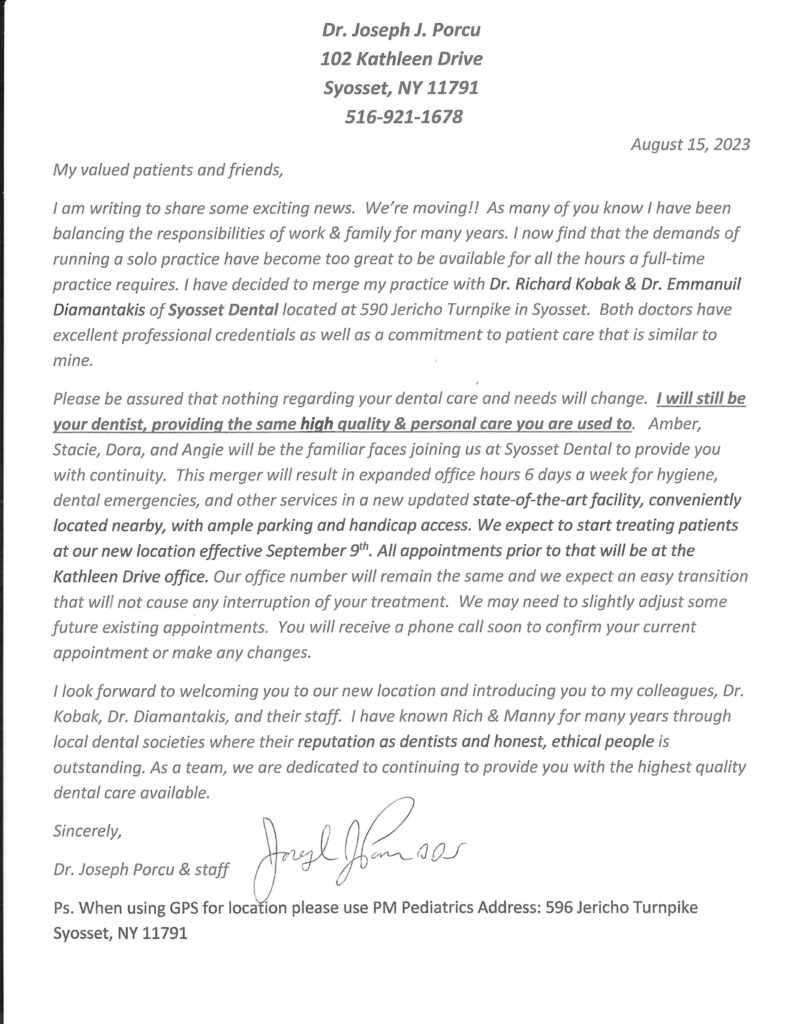 Your dentist might not be the first person you consider visiting when you suffer from chronic headaches. After at-home remedies and over-the-counter medications fail to keep your headaches at bay, many people consider seeing their doctors to see if there’s something more serious to worry about. However, for many people, the source of their chronic headaches can be traced to an oral health issue, such as TMJ disorder, bruxism, or obstructive sleep apnea. The only way to find relief from such headaches is to visit your dentist for a thorough examination and appropriate treatment. (more…)
Your dentist might not be the first person you consider visiting when you suffer from chronic headaches. After at-home remedies and over-the-counter medications fail to keep your headaches at bay, many people consider seeing their doctors to see if there’s something more serious to worry about. However, for many people, the source of their chronic headaches can be traced to an oral health issue, such as TMJ disorder, bruxism, or obstructive sleep apnea. The only way to find relief from such headaches is to visit your dentist for a thorough examination and appropriate treatment. (more…)
Why Bad Breath Is More Troublesome than You Think
 Despite being a common punch line, bad breath is no joke to those who experience it. In addition to the embarrassment of always knowing your breath smells, there’s also the frustration of failing to rid yourself of it, no matter how many remedies you try. The more you try such remedies, the longer it can take you to seek treatment and finally find the right solution. If your bad breath is consistent, then professional dental treatment may be the only way to address what’s causing it and finally free yourself from its grasp. (more…)
Despite being a common punch line, bad breath is no joke to those who experience it. In addition to the embarrassment of always knowing your breath smells, there’s also the frustration of failing to rid yourself of it, no matter how many remedies you try. The more you try such remedies, the longer it can take you to seek treatment and finally find the right solution. If your bad breath is consistent, then professional dental treatment may be the only way to address what’s causing it and finally free yourself from its grasp. (more…)
3 Easy Ways to Transform Your Smile’s Appearance
 Keeping your smile healthy is an ongoing process, and when successful, you can avoid many of the concerns that can affect your teeth and gums. However, even with excellent care and dental maintenance, you may still develop cosmetic concerns with your smile’s appearance, and the ability to correct those concerns is an important aspect of professional dental treatment. Today, we examine three effective ways to transform your smile in a conservative manner using highly customized cosmetic dentistry treatment. (more…)
Keeping your smile healthy is an ongoing process, and when successful, you can avoid many of the concerns that can affect your teeth and gums. However, even with excellent care and dental maintenance, you may still develop cosmetic concerns with your smile’s appearance, and the ability to correct those concerns is an important aspect of professional dental treatment. Today, we examine three effective ways to transform your smile in a conservative manner using highly customized cosmetic dentistry treatment. (more…)
Things that Make Bruxism a Serious Problem
 Grinding your teeth too often can be a serious problem, but for many people who do it, it might not be obvious at first. Known as bruxism, the constant and subconscious habit of grinding teeth together affects millions of people of all ages, many of whom aren’t aware of it until their dentists officially diagnose it. Fortunately, you can detect and diagnose bruxism sooner by sticking to a regular schedule of preventive exams and cleanings with your dentist. During each visit, a careful inspection of your teeth and oral tissues can reveal any signs or symptoms that you have bruxism, and what treatment may be best to help you strop grinding your teeth. (more…)
Grinding your teeth too often can be a serious problem, but for many people who do it, it might not be obvious at first. Known as bruxism, the constant and subconscious habit of grinding teeth together affects millions of people of all ages, many of whom aren’t aware of it until their dentists officially diagnose it. Fortunately, you can detect and diagnose bruxism sooner by sticking to a regular schedule of preventive exams and cleanings with your dentist. During each visit, a careful inspection of your teeth and oral tissues can reveal any signs or symptoms that you have bruxism, and what treatment may be best to help you strop grinding your teeth. (more…)
Does Your Oral Health Change as You Get Older?
 Time can be either a friend or foe to your oral health. For instance, sticking to a strictly timed schedule of routine dental care can help you avoid most common dental health issues. However, if one develops, then waiting to see your dentist could give it plenty of time to grow worse. In a more general sense, the time that passes as you age can also have an impact on the quality of your oral health. Your risks for issues like gum disease and tooth loss may rise, as can the need to visit your dentist more often to maintain your healthy smile. (more…)
Time can be either a friend or foe to your oral health. For instance, sticking to a strictly timed schedule of routine dental care can help you avoid most common dental health issues. However, if one develops, then waiting to see your dentist could give it plenty of time to grow worse. In a more general sense, the time that passes as you age can also have an impact on the quality of your oral health. Your risks for issues like gum disease and tooth loss may rise, as can the need to visit your dentist more often to maintain your healthy smile. (more…)
Key Factors in Preventing or Treating Gum Disease
 As you grow older, your risks for certain oral and overall health concerns can become increasingly higher. Gum disease (or periodontal disease) is one of those concerns, and if it’s allowed to develop, the resulting inflammation can have a significant impact on your oral health. Fortunately, preventing and treating gum disease is often more convenient and sustainable than many patients expect. If you haven’t yet developed it, excellent hygiene and dental care can help you avoid it. If you have, then the same methods – coupled with ongoing periodontal maintenance – can help you control it and prevent many of its more serious consequences. (more…)
As you grow older, your risks for certain oral and overall health concerns can become increasingly higher. Gum disease (or periodontal disease) is one of those concerns, and if it’s allowed to develop, the resulting inflammation can have a significant impact on your oral health. Fortunately, preventing and treating gum disease is often more convenient and sustainable than many patients expect. If you haven’t yet developed it, excellent hygiene and dental care can help you avoid it. If you have, then the same methods – coupled with ongoing periodontal maintenance – can help you control it and prevent many of its more serious consequences. (more…)
Is It Past Time for Your Dental Cleaning?
 Most people know that the recommended schedule for dental checkup and cleaning appointments is generally once every 3-4 months. In the absence of any pressing dental concern, like periodontal disease, this schedule (along with consistently good hygiene at home) helps ensure that your teeth and gums aren’t overwhelmed by harmful plaque and tartar. However, knowing the schedule isn’t always enough to encourage people to stick to it. In fact, skipping professional preventive dental care appointments is one of the biggest reasons why conditions like tooth decay and gum disease still develop. That’s why it’s important to attend every checkup and cleaning appointment that your dentist recommends. (more…)
Most people know that the recommended schedule for dental checkup and cleaning appointments is generally once every 3-4 months. In the absence of any pressing dental concern, like periodontal disease, this schedule (along with consistently good hygiene at home) helps ensure that your teeth and gums aren’t overwhelmed by harmful plaque and tartar. However, knowing the schedule isn’t always enough to encourage people to stick to it. In fact, skipping professional preventive dental care appointments is one of the biggest reasons why conditions like tooth decay and gum disease still develop. That’s why it’s important to attend every checkup and cleaning appointment that your dentist recommends. (more…)
3 Techniques to Deal with Common Toothache Causes
 When you have a toothache and you aren’t sure what it means, the discomfort might not seem like an emergency if it isn’t too severe. The truth is, most toothaches have causes that shouldn’t be ignored. Otherwise, they’ll only grow worse over time, both in terms of discomfort and the affect on your overall oral health. Today, we examine three common techniques that might help you deal with your toothache and stop it from recurring, hopefully before it requires more extensive treatment. (more…)
When you have a toothache and you aren’t sure what it means, the discomfort might not seem like an emergency if it isn’t too severe. The truth is, most toothaches have causes that shouldn’t be ignored. Otherwise, they’ll only grow worse over time, both in terms of discomfort and the affect on your overall oral health. Today, we examine three common techniques that might help you deal with your toothache and stop it from recurring, hopefully before it requires more extensive treatment. (more…)
Could Laser Technology Make Your Treatment Easier?
 Many people are surprised just how far the technology at their dentist’s office has advanced. For example, in a few of today’s modern dental offices, lasers have become common in many different forms of treatment. The technology can be utilized for some procedures that require trimming soft oral tissues as an alternative to the scalpel that’s traditionally used. For procedures that qualify for it, the specially calibrated diode laser offers a number of different benefits in the form of improved precision, greater comfort, and more esthetic overall results. (more…)
Many people are surprised just how far the technology at their dentist’s office has advanced. For example, in a few of today’s modern dental offices, lasers have become common in many different forms of treatment. The technology can be utilized for some procedures that require trimming soft oral tissues as an alternative to the scalpel that’s traditionally used. For procedures that qualify for it, the specially calibrated diode laser offers a number of different benefits in the form of improved precision, greater comfort, and more esthetic overall results. (more…)
Will Cavities Ever Be a Non-Issue?
 As dental health technology and techniques become increasingly more advanced, it can often seem like what used to be common issues are no longer a big deal. For example, cavities (the product of tooth decay) used to be a significant issue, as they would continue to erode a tooth until the condition became severe. Today, however, tooth decay is largely preventable, and when it does develop, it can be just as easily treated to save the tooth and restore its function. Cavities may never become a complete non-issue, but we can help you prevent it from being a serious issue, or prevent it from forming at all, with the right care and treatment. (more…)
As dental health technology and techniques become increasingly more advanced, it can often seem like what used to be common issues are no longer a big deal. For example, cavities (the product of tooth decay) used to be a significant issue, as they would continue to erode a tooth until the condition became severe. Today, however, tooth decay is largely preventable, and when it does develop, it can be just as easily treated to save the tooth and restore its function. Cavities may never become a complete non-issue, but we can help you prevent it from being a serious issue, or prevent it from forming at all, with the right care and treatment. (more…)











